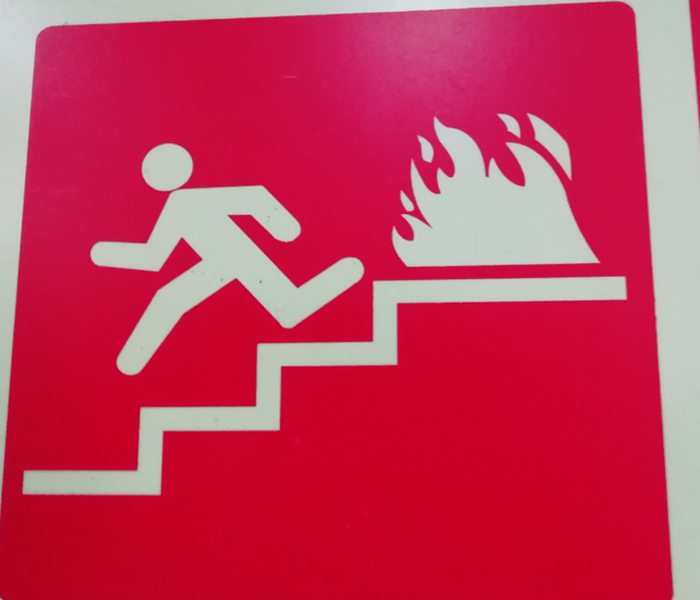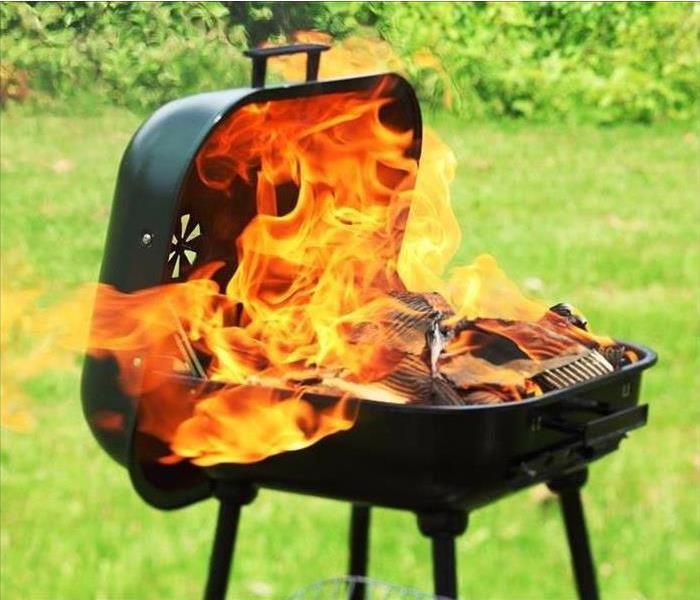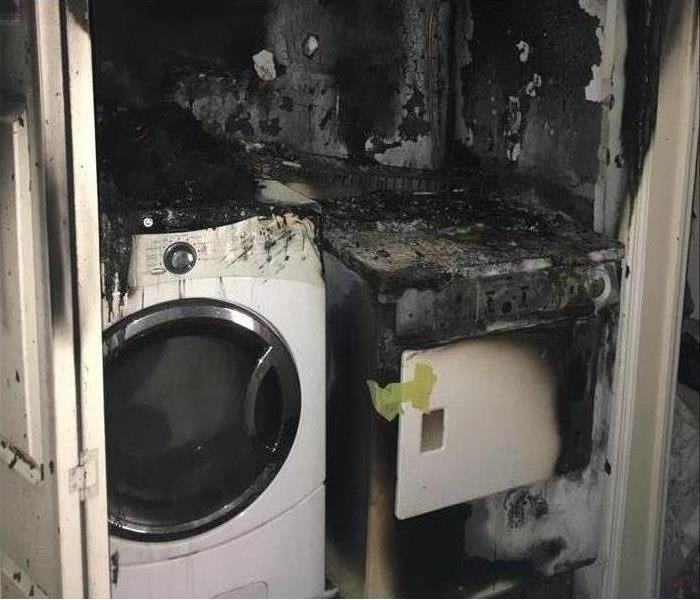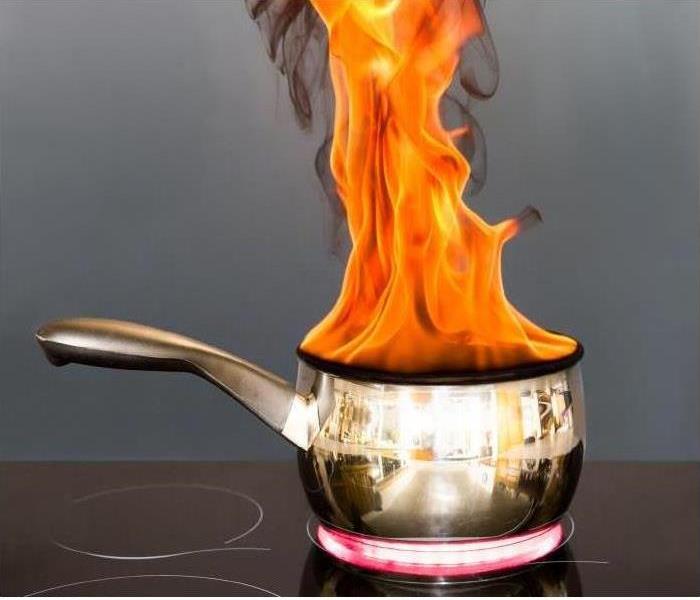Archived Fire Damage Blog Posts
Escaping a Fire
6/1/2022 (Permalink)
 Make sure you are prepared and have a plan for where and how you can escape from any fire.
Make sure you are prepared and have a plan for where and how you can escape from any fire.
Causing more than 2,500 deaths and 12,600 injuries each year in the United States, house fires are extremely dangerous for those that are unprepared for the event. But they are preventable.
To be prepared should a fire occur in your home, it’s important to know what to do:
- Before a fire
- During a fire
- After a fire
To ensure that your family remains safe throughout the ordeal.
It takes just two minutes for a fire to become life-threatening and just five minutes for a residence to become consumed by a fire. While the flames are what most people fear, that’s not what’s most dangerous as the heat and smoke do most of the damage. This is because the inhalation of extremely hot air can sear the lungs. A fire also has the ability to produce poisonous gases that can make you disoriented and drowsy making them all the more dangerous. In fact, the leading cause of fire deaths is asphyxiation which exceeds burns by a three to one ratio.
Preparing for a Fire
To make sure you’re prepared in the event of a fire, there are certain precautionary measures that must be taken to ensure your safety. The most important step is to create an evacuation plan for your family. Every second counts when a home is filling up with smoke so you need to know the fastest way out. Creating a plan and going over it with each member of your family will ensure that everyone can get out safely.
When developing your evacuation plan, make sure that you have two routes to escape each room in case one is blocked. Once your plan is formed, you should practice the plan at least twice a year. Being prepared for a potential fire means making sure that windows aren’t locked, screens can be taken out quickly, and that security bars can be opened. You should also have your family practice feeling around in the dark with their eyes closed replicating the environment they’ll be in if there’s a fire and teach the children not to hide from firefighters who are there to help.
The most important device to making sure you can safety escape a fire is a smoke alarm. Having working smoke alarms will significantly increase your chances of surviving the fire. To make sure that your smoke alarm will alert you of a fire in the home, test the batteries monthly, replace the batteries at least once a year, and replace the smoke alarm every eight to 10 years.
How to Escape a Fire
If a fire does occur in your home, you should escape the building as quickly as possible. However, there are some things you need to remember to safety evacuate. The first step is to get to the floor and crawl to the exit as heavy, toxic smoke and poisonous gases gather initially at the ceiling. When you get to a door, feel the doorknob and door before opening it. If either the doorknob or door is hot, you should leave it closed and go to your alternate way out. You should also leave the door closed if smoke is coming from around it. If you are able to open the door, do so slowly and be ready to shut it quickly should heavy smoke or fire be on the other side.
But what happens if you can’t get out? If the event occurs where you’re trapped in a room, cover the vents and cracks around any doors with cloth or tape to keep any smoke out. Then call the fire department and tell them where you are. You can use a light colored cloth or flashlight to get the attention of the firefighters. If you catch on fire yourself, simply stop, drop, and roll with your hands over your face to put yourself out.
What to Do After a Fire
If you’ve suffered a fire in your home rendering it uninhabitable and you have nowhere to go, contact your local disaster relief service like The Red Cross. If you have fire insurance, call the insurance company for details on protecting your property. You also should contact the professionals at SERVPRO of Sebastian to remediate the situation as soon as possible. The sooner they begin the restoration process, the more of your home and possessions will be salvaged.
A house fire is a devastating event that can lead to serious injury or death if you’re not properly prepared. These tips will ensure that you’re prepared for a fire and that you and your family can escape safely.
Grilling Accidents can Lead to Fire Damage on Your Home's Patio
5/4/2022 (Permalink)
 Fires on Properties, Both Outdoors and Inside Sebastian Properties, Get Recovery Help from SERVPRO,
Fires on Properties, Both Outdoors and Inside Sebastian Properties, Get Recovery Help from SERVPRO,
SERVPRO Restores Outside Living Areas to Pre-Loss Fire Damaging Conditions
Year-round cooking out is one of the perks of living in our sunny state. Sebastian area residents can grill guests food while entertaining on the patio. Preparing food outside keeps the kitchen inside cleaner while still providing a beautiful setting for everyone.
Holding parties outside in the Spring and Summer months, can result in fire damage if grills and fuel endure mishandling or accidents happen. Just like in the kitchen, fires can spread quickly if grease catches on fire. Charcoal spilling out can also spread out and catch outside furnishings or other items on fire. Being outdoor, the smell of smoke can avoid detection, allowing fire or smoldering embers to grow.
Garages, patio overhangs, and other structures are at risk of fire damage when such situations develop. At SERVPRO, we train our technicians so they can restore, though not always replace, any interior or exterior construction after a fire takes place. They earn certificates, such as the Fire and Smoke Restoration (FSRT), from the IICRC, ensuring their capabilities in restoring the many different structures they might encounter at various homes and businesses.
Restorative work includes much more than tearing out damaged and unusable components of residences. Cleaning soot and smoke deposits from affected areas is a large part of what we do when working on a home. This cleaning aspect includes removing grime from the decorative brick on walkways and exterior walls, concrete patios, decks, and anything else whose surfaces become covered in soot. Soft materials like outdoor furniture cushions and other upholstery can also benefit from attention by our employees. We work hard to make everything “Like it never even happened”, so any future barbeques can proceed as planned.
When an outdoor fire burns, chemicals for pools, lawns and insect control can often become involved. We can also help dispose or otherwise handle such situations, so you do not need to worry about these posing any problems to your children, pets, or lawn. Minimizing spills from these substances also protects wildlife and groundwater.
SERVPRO of Sebastian, wants to assist you in resolving any fire damage at your residence. Our 24-hour service is always ready to answer your call at (386) 677-9993.
Is your dryer vent clean?
4/11/2022 (Permalink)
 A blocked dryer vent can cause a major problem with smoke and fire damage.
A blocked dryer vent can cause a major problem with smoke and fire damage.
So, what are the signs your vent needs cleaning?
As a homeowner in Indian River County, you're probably very diligent about fire safety. You may have a fire extinguisher and smoke detectors on every floor, but have you checked your dryer vent lately? Many homes are damaged each year as the result of a lint fire. If the vent isn't cleaned out regularly, a dryer fire can result.
Clothes Are Taking Too Long To Dry
If your vent is blocked, your clothes can take up to two or three times as long to dry. You may find that the clothes you put in for a regular drying time are still a little damp when the cycle is over. This is happening because the blocked vent isn't allowing the moisture to be released to the outside.
Hot Dryer and Clothes
A blocked vent can also cause excess heat. If your laundry feels unusually hot when you take it out, and the outside of the dryer feels very hot when you touch it, this could be the problem.
Burning Smell
If you smell something burning inside the dryer, that's a sure sign of trouble. The drum casing, exhaust tube, and trap can get clogged, which makes it easy for a lint fire to start. If you're smelling smoke, turn off the dryer immediately and call a professional right away to inspect it.
No Regular Inspections
Your dryer vent should be inspected at least once a year by a vent cleaning specialist. A do-it-yourself job is certainly an option, but hiring a professional can ensure that the job is done thoroughly. These technicians are well acquainted with all the various brands of dryers and have the proper equipment to efficiently clean out the vent.
A lint fire can be a dangerous situation and cause a great deal of damage. But you can easily prevent a fire from happening by looking out for the signs outlined above.
#ventfires #dryerfire #SERVPROfirecleanup
Unattended Cooking Fires
1/26/2022 (Permalink)
Did you know last year many kitchen fires were mainly caused by unattended cooking?
Here are some stats of damages caused by kitchen fires:
Cooking fire stats:
- Cooking equipment is the leading cause of home fires and fire injuries, causing 49% of home fires that resulted in 21% of the home fire deaths and 44% of the injuries.
- Two-thirds (66%) of home cooking fires start with the ignition of food or other cooking materials.
- Clothing is the item first ignited in less than 1% of these fires, but clothing ignitions lead to 8% of the home cooking equipment fire deaths.
- Ranges or cooktops account for three-fifths (61%) of home cooking fire incidents.
- Unattended equipment is a factor in one-third (31%) of reported home cooking fires and over half (53%) of the associated deaths.
- Frying dominates the cooking fire problem.
Here are some tips on cooking especially with oil or frying:
What you should know about home cooking safety
- Be on alert! If you are sleepy or too tired to cook. Do not cook.
- Stay in the kitchen while you are frying, grilling, boiling, or broiling food.
- If you are simmering, baking, or roasting food, check it regularly, remain in the kitchen while food is cooking, and use a timer to remind you that you are cooking.
- Keep anything that can catch fire — oven mitts, wooden utensils, food packaging, towels, or curtains — away from your stovetop.
If you have a cooking fire
- Just get out! When you leave, close the door behind you to help contain the fire.
- Call 9-1-1 or the local emergency number after you leave.
- If you try to fight the fire, be sure others are getting out and you have a clear way out.
- Keep a lid nearby when you’re cooking to smother small grease fires. Smother the fire by sliding the lid over the pan and turn off the stovetop. Leave the pan covered until it is completely cooled.
- For an oven fire, turn off the heat and keep the door closed.
Safety considerations for cooking with oil
- Always stay in the kitchen when frying on the stovetop.
- Keep an eye on what you fry. If you see wisps of smoke or the oil smells, immediately turn off the burner and/or carefully remove the pan from the burner. Smoke is a dangerous sign that the oil is too hot.
- Heat the oil slowly to the temperature you need for frying or sautéing.
- Add food gently to the pot or pan so the oil does not splatter.
- Always cook with a lid beside your pan. If you have a fire, slide the lid over the pan and turn off the burner. Do not remove the cover because the fire could start again. Let the pan cool for a long time. Never throw water on the fire.
- If the fire does not go out or you don’t feel comfortable sliding a lid over the pan, get everyone out of your home. Call the fire department from outside
After the fire, call SERVPRO of Sebastian, we are open 24/7 and we are there when you need us the most.
How to prevent a Christmas Tree Fire
12/13/2021 (Permalink)
 Make sure to turn the lights off on you holiday trees while away and/or sleeping!
Make sure to turn the lights off on you holiday trees while away and/or sleeping!
With Christmas around the corner and many people love having a Christmas tree up.
Did you know every year?
- Between 2015-2019, U.S. fire departments responded to an average of 160 home fires that started with Christmas trees per year. These fires caused an average of 2 deaths, 12 injuries, and $10 million in direct property damage annually.
- On average, one of every 52 reported home fires that began with a Christmas tree resulted in a death, compared to an average of one death per 135 total reported home fires.
- Electrical distribution or lighting equipment was involved in 44% of home Christmas tree fires.
- In one-quarter (25%) of the Christmas tree fires, some type of heat sources, such as a candle or equipment, were too close to the tree.
- One-fifth (21%) of Christmas tree fires were intentional.
- Roughly three-quarters of Christmas tree fires occurred in December or January.
- Two of every five (39%) home Christmas tree fires started in the living room.
Holiday decorations
- U.S. fire departments responded to an estimated average of 780 home structure fires per year that began with decorations, excluding Christmas trees, in 2013-2017. These fires caused an annual average of three civilian fire deaths, 34 civilian fire injuries, and $12 million in direct property damage.
- Nine percent of decoration fires were intentional.
- The decoration was too close to a heat source such as a candle or equipment in more than two of every five (44%) fires.
- One-fifth (21%) of the decoration fires started in the kitchen. Sixteen percent started in the living room, family room or den.
- One-fifth (20%) of the home decoration fires occurred in December.
Candles
- On average, 22 home candle fires were reported each day between 2013-2017.
- Three of every five (60%) candle fires started when something that could burn, such as furniture, mattresses or bedding, curtains, or decorations, was too close to the candle.
- Candle fires peak in December. January ranked second. Eighteen percent of December candle fires started in the living room and 8% started in the dining room compared to 14% and 3% for those areas during the rest of the year.
- The two peak days for candle fires were Christmas and Christmas Eve.
Holiday cooking
Thanksgiving is the peak day for home cooking fires, followed by Christmas Day and Christmas Eve.
Cooking equipment was involved in one of every five (19%) home decoration fires. This can happen when a decoration is left on or too close to a stove or other cooking equipment.
Fireworks
- Ten percent of fireworks fires occur during the period from December 30 through January 3, with the peak on New Year's Day.
National Fire Protection Association - Christmas Fire Stats
Some tips on how to prevent a fire or damage during the holidays.
- Pick a fresh-looking tree.
- Keep the tree watered.
- Keep the tree away from heat.
- Shake the tree often to remove dried pines.
- Check the tree's lights look for burned bulbs.
- Turn off your tree lights when sleeping or not at home.
- Get rid of your tree soon after the holidays.
We at SERVPRO of Sebastian are here to help.
#christmastreefire #christmaslightfire #elctricalfire #holidayfire #SERVPROsebastian #sebastian,fl
Careful Frying that Turkey!
11/2/2021 (Permalink)
With Thanksgiving around the corner and spending time with our families, many people like to deep fry their turkeys. Did you know that each year there are over 15 million dollars in loss due to fires caused by turkey deep fryers?
Some Tips:
- Always check your fire extinguisher and make sure it is up to date and full.
- Keep the fryer at least 10 feet from your home.
- Make sure the turkey is thawed and there are no ice crystals.
- Make use of the propane tank that is far from the fryer.
- Have your phone handy and charged in case of emergency.
- If you have a fire happen, Call 911.
- Use extinguisher if possible.
After the fire is out, check your damages and call SERVPRO of Sebastian and our professional teams will be available 24/7.
Heating Your Home
3/18/2021 (Permalink)
If you have a fire in your home, SERVPRO is there to help. But we also want to help you prevent fires in your home.
Did you know that heating equipment is the leading cause of home fire deaths, according to the National Fire Protection Association (NFPA)? Cold temperatures during these winter months have led to people frequently using their heaters. Half of these heating equipment fires predictably take place in the winter months of December, January, and February when heating equipment is used the most.
Abiding by the following safety measures will keep yourself and your family safe from any potential dangers of using heaters in your home.
Stay Three Feet Away
One way to stay safe when heating your home is to keep flammable items at least three feet away from heating equipment. That includes a furnace, fireplace, wood stove, or portable space heater.
Enforce a Three-Foot Rule for Children
The curiosity of children can cause a problem if they focus their attention on one of these heating options. Wanting to explore the equipment, the child could accidentally catch on fire or start a fire in the house. Therefore it’s a good idea to have a three-foot “kid-free zone” around all open fires and space heaters.
Don’t Use Your Oven As a Heater
Never attempt to use your oven to heat your home. The inefficacy of an oven as it pertains to heating could cause it to go out or not burn well which could potentially lead to carbon monoxide poisoning endangering the lives of your whole family.
Use Only Qualified Professionals When Installing Heating Equipment
Make sure a qualified professional install your heating equipment. An inexperienced person installing your space heater, water heater, or central heating equipment could lead to serious mistakes that could cause a fire. Hiring qualified professionals will ensure that the person installing your equipment adheres to local codes and manufacturer’s instructions.
Get Your Annual Chimney Inspection
It’s important to have your heating equipment or chimney cleaned and inspected every year by a qualified professional. In early 2000, the NFPA set a new standard that ensures that inspections include a thorough inspection and cleaning. Based on the purpose of the inspection (annual inspection, system change or real estate transaction, potential hazard) the inspector will inspect on one of three levels. The thoroughness of the inspection will increase at each level of the inspection.
Never Leave Portable Heaters On When Leaving a Room
Always turn off and unplug portable heaters when leaving a room or going to bed. Portable heaters can short out while you’re away and start a fire before you return.
Make Sure to Use Correct Fuel
Use the right kind of fuel when using fuel-burning space heaters. The manufacturer will specify which fuel that specific space heater will need. Using the wrong kind of fuel could cause the fuel to burn hotter than the equipment was designed for and could cause a fire in your home.
Use a Fireplace Screen
It’s important to make sure that your fireplace has a screen in front of it. Without a screen, sparks could fly into the room and start a fire. Also, if you plan to dispose of ashes in a metal container, ashes should be cooled prior to entering a metal container. The container should also be kept a safe distance away from your home.
Test Smoke Alarms Monthly
If a fire starts in your home in Grant-Valkaria, a smoke alarm can save your life. Smoke spreads quickly and a properly working smoke alarm will give you enough time to get out. So make sure you test your smoke alarms each month. Also, make sure to replace your smoke detectors once every ten years.
Use Ventilation
When burning anything larger than a candle, make sure to provide good ventilation. You can do this by opening windows, doors, or fireplace fumes. Good ventilation will substantially reduce the amount of smoke that can be harmful to those in the home.
On cold days heating is a must. But without the use of certain precautions, it can be a very dangerous decision. By following the safety measures highlighted by the NFPA, you can ensure that you will be warm and safe during the cold winter months.
#heatersafety #spaceheater #righttempforhome #heatertips #SERVPROSebastian






 24/7 Emergency Service
24/7 Emergency Service




